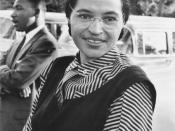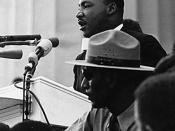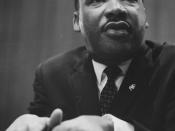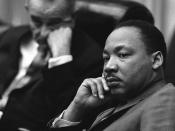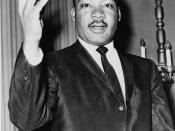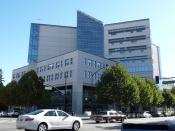I had a dream By Dr. Martin Luther King Jr.
A common speech written during the turbulent times of the civil rights movement would often be filled with violent rhetoric, political demands, and extreme ultimatums. That is not so of Dr. Martin Luther King JR's. speech, performed in front of the Lincoln memorial, in August of the year 1963, appropriately titled "I Have A Dream." Dr. King's speech was a uniquely organized masterpiece, detailing the strife of Negroes throughout America since the abolition of slavery. With this speech Dr. King points out the injustices that blacks were forced to endure by using many different literary techniques. While Dr. King did a wonderful job of detailing the struggle of a common Negro living in American society, he manages to keep his speech all-inclusive, while still reflecting upon his own experiences. Each word that Dr. King put into this speech flowed perfectly together and should not be evaluated on an individual basis.
It is the purpose of this essay to examine this speech and detail the reasons why it became the foremost studied piece of literature to come out of the pain and suffering endured during the civil rights movement.
Similar to the way that Abe Lincoln began "The Gettysburg Address," Dr. King also did a very effective job of not speaking over his audience. He did not jam his speech with political rhetoric or policy positions. Instead he simply spoke to a crowd of demonstrators like a priest would his parishioners during the homily of a Sunday mass. It is no coincidence that one can see many links to Dr. King's faith in God throughout his speech in Washington D.C. Dr. King strives to appeal to every mans sense of righteousness when he says, "Now is the time to open the doors of opportunity to all of God's children." With the strong belief that God created everyone with the same amount of love, Dr. King soon goes on to the next major fundamental of his vision to achieve racial equality.
After firmly establishing his belief that equality was the will of God, and that justice was the establishment of god's will, Dr. King goes on to state that for the civil rights movement to be a spiritual as well as social movement it must be a non-violent one. Dr. King carefully sows that belief into his speech with a clever metaphor. "Let us not seek to satisfy our thirst for freedom by drinking from the cup of bitterness and hatred." Dr. King was wise enough to see that equality could not be achieved by "degenerating into physical violence." He recognized that love is a stronger emotion than hatred, and that the bonds of injustice could more easily be thrown aside by loving every man as your equal. Dr. King states numerous times that along the road to racial equality, violence could not have a place.
Repetition was also a literary tool used by King to establish exactly how drastically the system needed to be changed. King began four sentences in a row by stating, "We can never be satisfied..." until various injustices were corrected. The final time that he repeated those words he ended his point with yet another easy to visualize metaphor. "And we will not be satisfied until justice rolls down like waters and righteousness like a mighty stream." Another reason that this speech was and still is so captivating to hear is because of the rhythm that Dr. King speaks at. Words seem to flow together in a way rarely found in political speeches. That is important because if a speech is told to slowly the speaker will loose the attention of his audience, similarly if a speech is told to quickly, the importance of the words is lost and the information can not be absorbed by the listener. King was very successful at making this vital speech ascetically pleasing.
Dr. King was also very wise to draw connections between his movement and the constitution that our forefathers wrote when our nation was founded. He recognized that since blacks were considered citizens, they must be given all the rights afforded to every citizen, black or white. That was a very effective point, to dispute that logic would be to dispute the very words and principals that our nation was founded on.
Yet another style of writing used thoughtfully by Dr. King is alliteration. The use of that tool of writing helps to both keep good cadence and rhythm but also to help the audience visualize the image that the speaker wishes to portray. When Dr. King says "This sweltering summer of the Negro's legitimate discontent," the listener can almost feel the strife of those oppressed people.
The strong use of metaphors in this speech is both deeply profound and yet still easily absorbed, thus easily turned to common conversation. When Dr. King states that in his dream he envisions "Every hill and mountain shall be made low, the rough places will be made plain, and the crooked places will be made strait." It is very interesting that that metaphor can be so easily visualized and understood. Dr. King is describing that in his dream he saw a nation where every hardship will be made into a lighter load for everyone, and that current injustices will be turned into righteousness, which is a spiritual metaphor, brought to bear on a contemporary reality.
The conviction and effort that Dr. King gave so selflessly to the cause of civil rights earned him a Nobel Peace Prize. Many of those same convictions can be heard and more importantly, visualized in his speech. Dr. King achieves that effect by using emotionally charged metaphors and clever alliteration. The attention of the audience is kept at a peak level due to the excellent speed at which he shares his dream. All of these uses of English combined are the reasons that Dr. King's speech can inspire emotions of extreme reverence, and more importantly, set in motion the winds of personal, as well as social change.
With the excelant use of similies and metaphors dr kng expressed the hardships, and injustices that his people endured.
